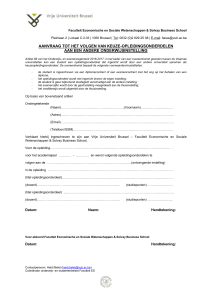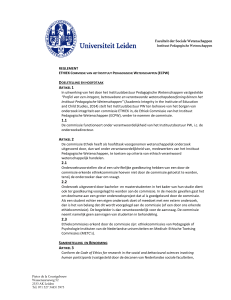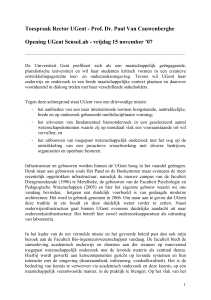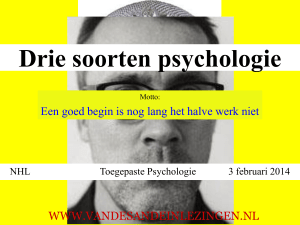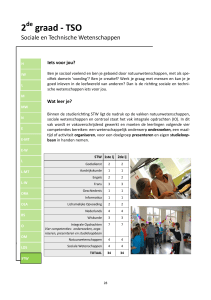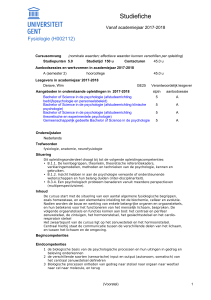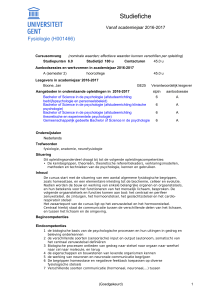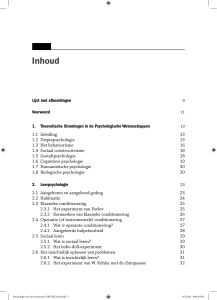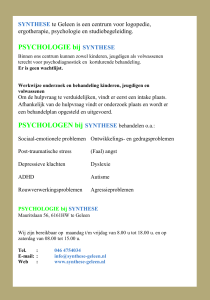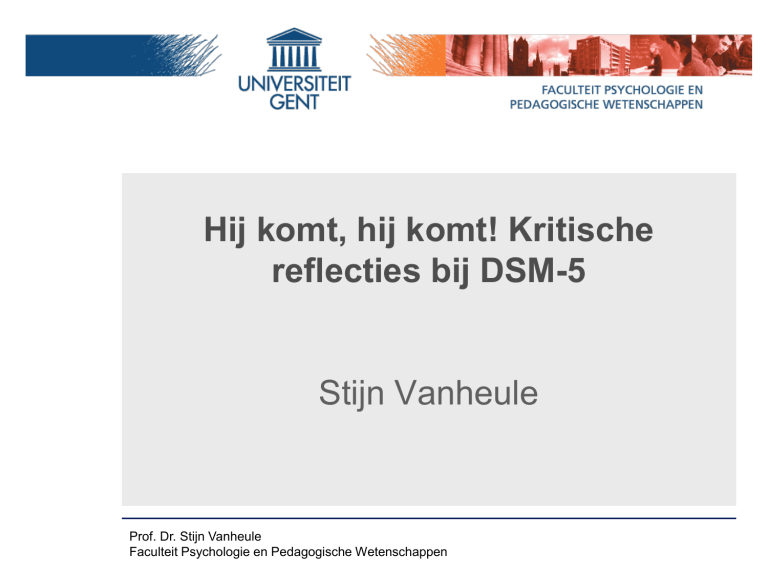
Hij komt, hij komt! Kritische
reflecties bij DSM-5
Stijn Vanheule
Prof. Dr. Stijn Vanheule
Faculteit Psychologie en Pedagogische Wetenschappen
APA & BPS: open brief aan het DSM-5
comité + petitie:
“… concerned about:
-the lowering of diagnostic thresholds for multiple disorder
categories
-introduction of disorders that may lead to inappropriate
medical treatment of vulnerable populations
-proposals that appear to lack empirical grounding.
In addition, we question proposed changes to the definition(s)
of mental disorder that deemphasize sociocultural variation
while placing more emphasis on biological theory”
Prof. Dr. Stijn Vanheule
Faculteit Psychologie en Pedagogische Wetenschappen
The lowering of diagnostic thresholds
for multiple disorder categories
- “DSM-IV was an unwitting contributor to three
false positive ‘epidemics.’ Its publication coincided
with high rates of ADHD, autistic disorder, and
childhood bipolar disorders” (Frances, 2010)
- DSM-5: risico op over-diagnosticering voor:
‘ADHD, mixed anxiety depression, binge eating,
mood dysregulation, attenuated psychotic
symptoms, generalized anxiety and adult attention
deficit’ (Batstra & Frances, 2012)
Prof. Dr. Stijn Vanheule
Faculteit Psychologie en Pedagogische Wetenschappen
Introduction of disorders that may lead
to inappropriate medical treatment of
vulnerable populations
Bvb. Premenstrueel Dysfore Stoornis?
Prof. Dr. Stijn Vanheule
Faculteit Psychologie en Pedagogische Wetenschappen
Prof. Dr. Stijn Vanheule
Faculteit Psychologie en Pedagogische Wetenschappen
Kritiek werkwijze DSM-5 commissie:
-
Geheimhouding: “When I first heard
about this agreement, I just went bonkers.
Transparency is necessary if the document
is to have credibility, and, in time, you’re
going to have people complaining all over
the place that they didn’t have the
opportunity to challenge anything.” (Spitzer,
2008)
-
Invloed farmaceutische industrie
stijgt: DSM-IV 57% DSM-5
69%
Prof. Dr. Stijn Vanheule
Faculteit Psychologie en Pedagogische Wetenschappen
2 psychologische en
psychotherapeutische
kritieken:
-Decontextualiserende
benadering van psychische
klachten
-Uitgesproken tendens tot
biomedicalisering
Prof. Dr. Stijn Vanheule
Faculteit Psychologie en Pedagogische Wetenschappen
Decontextualiserende benadering van
psychische klachten
Wat zijn psychische symptomen en klachten? “They are constructs
in the sense that subjects create sense or construct a meaning out of
an inchoate preconceptual and preverbal experience. They are
personal in that although social and cultural influences will help their
articulation, the experiences themselves are unique to the individual
and inaccessible to anyone else” (Markova & Berrios, 2009, p. 344)
Cambridge Model of Symptom Formation.
Decontextualiserend benaderen van psychische symptomen en
klachten
Prof. Dr. Stijn Vanheule
Faculteit Psychologie en Pedagogische Wetenschappen
Indien onze kritiek niet klopt: criterium-gerichte
diagnostiek betere betrouwbaarheid
Spitzer en Fleiss (1974): betrouwbaarheidsstudies
(kappa) jaren 50, 60 en 70:
Enkel voor ‘organisch hersensyndroom’ (kappa ≥ 75)
excellente betrouwbaarheid; meeste andere diagnostische
hoofdcategorieën matig tot goed (mentale achterstand:
kappa = .72; alcoholisme: kappa =.71; psychose: kappa
=.55; affectieve stoornis: kappa = .41;
persoonlijkheidsstoornis of neurose: kappa =.44); ‘psychofysiologische reactie’ (kappa .38)
Gemiddelde kappa van .47
Prof. Dr. Stijn Vanheule
Faculteit Psychologie en Pedagogische Wetenschappen
Wat met DSM-III-R?
Williams et al. (1992): SCID voor DSM-III-R: 25
beoordelaars, 390 patiënten, 202 ‘niet-patiënten’.
Betrouwbaarheid voor de beoordeling van huidige
stoornissen bij niet-patiënten zwak (kappa = .37), patiënten
matig tot goed (kappa = .61).
18 types stoornissen beoordeeld: voor 4 excellente
betrouwbaarheid vastgesteld, 13 matig tot goed, 1 zwak
betrouwbaarheid van DSM-III-R diagnoses niet
spectaculair beter dan betrouwbaarheidsstatistieken over
de ‘onbetrouwbare’ pre-DSM diagnostiek (Kutchins & Kirk,
1999)
Prof. Dr. Stijn Vanheule
Faculteit Psychologie en Pedagogische Wetenschappen
Wat met DSM-IV?
Studie Kirk & Hsieh (2004): fictieve beschrijving
van een jongen die voldoet aan DSM de
inclusiecriteria voor een gedragsstoornis.
1334 psychiaters, psychologen en sociaal
werkers
29 verschillende DSM hoofddiagnoses; 45.5%
diagnosticeert effectief een gedragsstoornis
Prof. Dr. Stijn Vanheule
Faculteit Psychologie en Pedagogische Wetenschappen
Wat met DSM-5?
DSM-5: normen kappa coëfficiënten: ≥.80 ’almost
miraculous’,.60 -.80 ’cause for celebration’, .40 -.60 ’a
realistic goal’,.20 -.40 ’acceptable’ (Kraemer et al., 2012, p.
14).
Stuk lager dan gewoonlijk gehanteerde normen
(Frances, 2012; Spitzer, Williams, & Endicott, 2012)
Prof. Dr. Stijn Vanheule
Faculteit Psychologie en Pedagogische Wetenschappen
Uitgesproken tendens tot biomedicalisering
DSM-I en II: psychologische factoren als mogelijke
oorzaak van psychiatrische problemen (‘neurosis’,
‘psychological reaction’)
Vanaf de DSM-III: neo-Kraepeliniaanse focus:
-descriptieve aanpak binnen medisch model
-klasseren op basis van a priori criteria (“Classification is
diagnosis”, Robins & Guze, 1970),
-focus op brein (“’the primary organ of psychiatric illness”
Compton & Guze, 1995) a-theoretisch?
Prof. Dr. Stijn Vanheule
Faculteit Psychologie en Pedagogische Wetenschappen
DSM-5
“Diagnoses in the DSM-III, DSM-III-R, and DSM-IV are
best understood as useful placeholders, based on careful
description, but not on deeper understanding” (Bernstein,
2011)
“complex brain disorder” i.p.v. “mental disorder”
(Reynolds, et al. 2009)
“It is our hope and expectation that through advances in
animal models, genetics, neuroimaging, and postmortem
investigations psychiatry will ultimately have a diagnostic
system based on etiology and pathophysiology” (Charney
et al., 2002)
Prof. Dr. Stijn Vanheule
Faculteit Psychologie en Pedagogische Wetenschappen
“The NIMH is launching the Research Domain Criteria
(RDoC) project to create a framework for research on
pathophysiology, especially for genomics and
neuroscience, which ultimately will inform future
classification schemes … RDoC are intended to ultimately
provide a framework for classification based on empirical
data from genetics and neuroscience” (Insel et al., 2010)
“As constructs with poorly defined boundaries whose
determination is dependent on interpretation, mental
symptoms are of a different order of data compared with for
example rates of blood flow, concentrations of
neurotransmitters or changes in contrast density” (Markova
& Berrios, 2009)
Prof. Dr. Stijn Vanheule
Faculteit Psychologie en Pedagogische Wetenschappen
louter descriptieve DSM-III en DSM-IV: ruimte voor
psychologische theorieën; DSM-5: ingeperkt!
Negeert de contextuele inbedding
Stimuleert medische consumptie
bvb. ADHD: 80% artsen ervaart druk om medicatie
voor te schrijven)
bruto uitgaven psychoactieve geneesmiddelen tussen
1998 en 2004: van 232,6 miljoen EUR tot 454,0
miljoen EUR.
1996: 390.000 personen gebruiken antidepressiva;
2006: 860.000
Prof. Dr. Stijn Vanheule
Faculteit Psychologie en Pedagogische Wetenschappen
Alternatief? (klinisch psychologisch /
psychotherapeutisch)
Herwaardering van de theorie-gestuurde
casusformulering
Accent op psychologische processen, ipv klinische
tekens en symptomen
Pleidooi voor loskoppeling DSM-diagnose
gesubsidieerde hulpverlening
Prof. Dr. Stijn Vanheule
Faculteit Psychologie en Pedagogische Wetenschappen
Meer info?
Vanheule, S. (2012). Hij komt, hij komt! Kritische reflecties
bij DSM-5. Tijdschrift voor Klinische Psychologie.
Vanheule, S. (2012). Diagnosis in the field of
psychotherapy: A plea for an alternative to the DSM-5.x.
Psychology and Psychotherapy: Theory, Research and
Practice, 85, 128-142.
Blog:
Prof. Dr. Stijn Vanheule
Faculteit Psychologie en Pedagogische Wetenschappen



